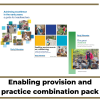A new survey carried out by Early Education, NAHT, NEU and UNISON has revealed that over a third (34%) of Maintained Nursery Schools are cutting staffing and services to balance their books as a result of lost income and additional Covid costs, coupled with a lack of certainty over the funding they will receive from spring 2022.
Maintained Nursery School leaders reported losing an average of over £70,000 of income, as well as having to spend an extra £8,000 for additional Covid-related costs.
Unlike some other schools, Maintained Nursery Schools were not eligible for exceptional cost funding for Covid from government and so have had to bear the brunt of these costs themselves. They were also not eligible for some government schemes which benefited private providers in the sector such as the business rates holiday or business loans.
The survey has demonstrated that the long-term future of many nursery schools is now seriously at risk. Almost half (46%) of respondents said that at the end of March 2021, they would be in deficit for the year. The average deficit reported was £76,000. Worryingly, only 23% of respondents confirmed that they could continue to operate within their current funding levels and over one in five (21%) reported that they have financial recovery plans in place or under discussion.
As a result of ongoing pressure from parents and the sector, the government has now finally confirmed funding for the next two terms. However, despite ongoing promises from government to find a long-term funding solution, these schools still have no clear picture of what their funding will look like beyond next spring. As things currently stand, they will be asked to allocate places without knowing what their budgets will be.
These latest findings suggest that the ongoing lack of certainty, coupled with the financial pressures of Covid continues to put the long-term sustainability of this vital sector at severe risk.
Paul Whiteman, general secretary of school leaders’ union NAHT, said: “We know that many Maintained Nursery Schools were already in a perilous financial position going into the pandemic. The last year has only deepened that crisis. If we are to avoid widespread closures of these nurseries, the government has to come forward with a long-term solution – this can cannot be kicked down the road any longer.”
Beatrice Merrick, Chief Executive of Early Education, commented: “Maintained nursery schools during the pandemic were a lifeline for local families: they stayed open for the most vulnerable children and children of critical workers, often taking in children from other settings which closed. They supported their families with remote learning – and often with food parcels and practical support. They were in touch with vulnerable families when health and social services were unable to maintain contact. Instead of this lifeline being supported, it is being put at risk by government failure to address their routine funding needs. Having been operating on a financial knife-edge for years, the pandemic has tipped the balance for too many schools, Government needs to act now to resolve the long-term funding issue and provide targeted financial help to those whose survival has been jeopardised by the pandemic.”
Kevin Courtney, Joint General Secretary of the National Education Union: “If the government was sincere in its assertion that maintained nursery schools provide a valuable service, then it would not leave them in such dire straits. A lack of long-term funding solutions and minimal support to help them through the pandemic, has left too many maintained nursery schools teetering on the edge of closure. It is essential that these settings are not lost and it is deeply damaging to these schools that year after year they have to live hand to mouth. The government must act now to guarantee viable long-term funding from September 2021.”
UNISON head of education Jon Richards said: “Getting secure, long-term funding in place to support maintained nursery schools for years, not months, must be a priority for the government. By dragging their feet on making a proper commitment, ministers are putting staff – many of whom who worked throughout the lockdowns – in fear of losing their livelihoods. And the families of children who’ve benefited from the specialist support of nursery staff may have to look elsewhere for the help they need. For those preparing to attend in September, the picture will look bleak if nurseries are forced to close.”
Cath Earley, Headteacher Greenacre Community School – Sefton: “During the last 12 months the sector’s priority as always was to support our children and families. This was with little thought to the cost and the impact on our budgets. We opened for essential workers, often admitting new children at short notice due to closure of other early year’s providers who were able to take advantage of financial incentives which excluded MNS. It’s disappointing but not surprising that the Government and ministers have failed to acknowledge yet again the important place we have in our local communities and the lives of our children and their families especially the more vulnerable. However, this has been at a significant financial cost.”
Notes: 200 of England’s remaining 389 maintained nursery schools responded to the online survey in March/April 2021. They were spread across 75 local authority areas.

Notes to editors:
Early Education (The British Association for Early Childhood Education) is the leading independent national charity for early years practitioners and parents, campaigning for the right of all children to education of the highest quality. Founded in 1923, it has members in England, Northern Ireland, Scotland and Wales and provides a national voice on matters that relate to effective early childhood education and care of young children from birth to eight. The organisation supports the professional development of practitioners through publications, training, conferences, seminars and access to a national and regional branch network. For more information on the work of Early Education visit www.early-education.org.uk









Early Education
2 Victoria Square
St Albans
AL1 3TF
T: 01727 884925
E: office@early-education.org.uk